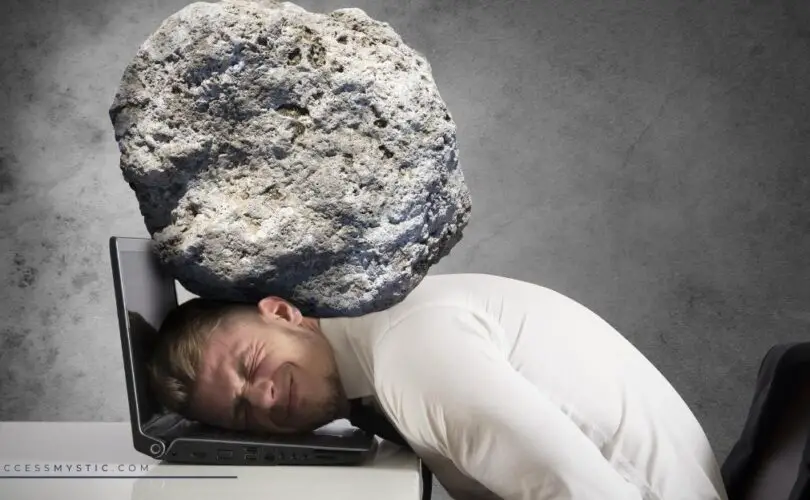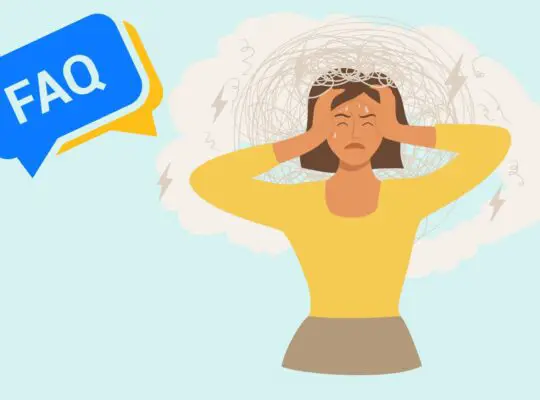It’s time to train your mind to induce the relaxation response, de-activate stress pathways in the brain and reduce concentrations of stress hormones to ease anxiety and counteract the harmful effects of stress on mind, body, and spirit.
Chronic Stress Kills and Maims
You may not realize it, but chronic stress kills and about 70% to 90% of the visits Americans are making to their primary care physician are due to stress and the health complaints that accompany it. Science Daily reports that it leaves you at a greater risk of catching a cold, diminished brain health and even developing cancer, mainly because of the constant state of arousal and elevated levels of cortisol.
Obviously, not everyone who deals with stress has chronic stress, some will experience acute stress, which is a short burst of stress in a situation that offers an immediate threat. In that moment, your fight or flight response kicks in and cortisol and adrenaline levels shoot, up to increase your focus and provide you with a necessary surge of energy.
Acute stress isn’t bad for you; it’s a normal part of life because once the threat has passed your cortisol levels return to normal. In fact, it may even save your life. However, when this is a persistent state you are at risk of the many health effects that come with chronic stress, including death.
So, what type of effect can excess cortisol levels have on your body? According to the Malaysian Journal of Medical Sciences, it can contribute to weight gain, create hormone imbalances, experience digestive problems, and increases the risk of diabetes, osteoporosis, heart disease, and cancer. It also impacts your adrenal glands, which can leave you feeling exhausted but wired at the same time. What of your brain and chronic stress?
The anxiety, memory loss, and brain fog are some of the more obvious effects of chronic stress on your brain. However, the majority of the effects are happening behind the scenes, they aren’t something that you are necessarily aware of.
While there are physical symptoms, there is a time where you won’t notice. As stress turns chronic it starts to change how your brain functions and its structure, (Psych Central) in fact, it can alter your DNA. It’s very likely that you won’t notice any changes initially, over time they will become more obvious.
Chronic stress also contributes to the production of free radicals, which can kill your brain cells, and they also increase the risk of cancer. Free radicals attack your brain cells a lot like oxygen does metal – the end result is rust.
For your brain, the end result is holes in the walls of your brain cells thus causing ruptures and eventual death of the brain cell itself (Glutamate induces formation of free radicals in rat brain synaptosomes, Alekseenko, et al). Additionally, with stress contributing to bad habits the increase of smoking, alcohol, and junk food also contributes to the production of free radicals.
It also leads to forgetfulness and a lack of control over your emotions resulting in serious mood swings. The memory issue is likely the first one you will start to notice as you realize you’re constantly losing things, forgetting appointments, and struggling to focus at work. When it comes to the emotional side of things we know, thanks to the Journal of Neuroscience, that stress triggers a signal in the brain that weakens factual memories and increases the areas of the brain that are associated with the strength of your emotions.
Let’s not forget how chronic stress feeds the vicious cycle of anxiety and fear. It builds within the fear center of your brain, the amygdala, and increases the activity, number, and size, of neural connections in the amygdala. What’s worse, though, is it prevents the production of fresh brain cells. While you lose brain cells daily, you should also create new ones to replace them. Unfortunately, chronic stress can prevent this from occurring.
Why? BDNF or brain-derived neurotrophic factor. This protein is necessary for the formation of new cells and maintaining the health of current cells. Essentially, it’s your brain’s fertilizer and low levels of this protein have been linked with a raft of brain conditions, from depression and schizophrenia to different types of dementia (Neurotrophins, synaptic plasticity, and dementia, Arancio, et al). Additionally, chronic stress reduces the level of dopamine and serotonin production, which can lead to depression. However, it should be noted that chronic levels of stress leave you at an increased risk for a variety of mental illnesses.
We may not yet have a full picture of what causes mental illness, however, researchers are moving forward in their clinical trials, and we do know that those with stress disorders have a higher ration of white versus gray matter. This is according to a study from Emory University School of Medicine (on the effects of traumatic stress on the brain, Brennan, et al).
Sadly, stress also leaves you stupid… think about it – often at the biggest moments of your life (whether it’s a speaking engagement, an exam, or a job interview) you are suddenly flooded with cortisol and relying on instinct instead of reasoning and rational thought. Yes, you may successful evade a lion on safari, but this isn’t much help when you’re sitting across from your boss asking for a raise.
Yale researchers have discovered that depression and stress shrink the brain. Unfortunately, chronic stress can also shrink your brain. It prevents new neurons from being generated in the hippocampus region of the brain, which is responsible for storing your memories. It’s critical for regulating emotions, storing memories, and for learning, as well as canceling the stress response once the event has passed. This can have an impact on your decision making and your ability to prevent the typical impulsive behavior.
Of course, there’s also the issue of toxins. The brain is sensitive to any type of toxin, but stress opens the floodgates for toxins to come in. While the brain has, a barrier in place to filter these substances to allow for essential nutrients it is compromised by chronic stress. Additionally, this leaky barrier increases the risk for multiple sclerosis, brain infections, and brain cancer (*).
Certainly, it also increases the risk of dementia, including Alzheimer’s, which is the most common form of dementia. In fact, more American adults fear this than even cancer and it is the sixth leading cause of American deaths. It’s expensive and one in three seniors in America will die of some type of dementia. It makes for grim reading, doesn’t it? There is some light at the end of the tunnel, though as there are plenty of ways you can make changes in your lifestyle to relieve stress.
How Meditation Helps Reduce Stress
Meditation trains your mind to induce the relaxation response, de-activate stress pathways in the brain and reduce concentrations of stress hormones to ease anxiety and counteract the harmful effects of stress on mind, body and spirit.
Whether it’s acute or chronic, stress and anxiety are a natural part of life. However, how you manage your stress is the difference between the two and your ability to cope with the pressures and adversity that life often throws your way. It’s all about the resources that you have to draw on which will allow you to deal with the challenges you face. Think of it as your emotional resources supply and demand.
It doesn’t really matter if the stressor is a valid one or not because the end result is stress, regardless of the stressor. You are under pressure to respond to every demand immediately and of course, you’re going to feel stressed out and wonder where your supply of resources has gone.
People talk a lot about how you can manage your stress levels by understanding what is essential, what should be prioritized, and what you can allow to fall away. How do you do that? According to the Mayo Clinic, meditation is an excellent place to start because with a bit of relief from the symptoms of stress your mind will begin to feel clearer allowing you to make the right decisions at the right time.
How can meditation relieve stress, though? There are a variety of reasons, in all honesty, with one of them being that it offers you the space, quiet, and time to distinguish between what demands are valid and which … just aren’t.
Consider for a moment how much easier life could be (and less stressful) if you were capable of sorting out the value of the demands being placed on you? It might sound easy, but often times there just isn’t the time or space in your life to do so, thankfully meditation provides this opportunity in spades.
That’s just on the demand front, though, don’t forget about the supply. Science has taught us that the brain has an innate ability to change throughout our lives. Its plasticity is incredible and that means we can train our brains to be more capable and one of the ways to do that is through meditating. It’s all about expanding your mind and training it how to respond to adverse situations.
We’ve spent so many decades talking about just how important a healthy body is that there are too many fad diets to keep up with, people are joining gyms (or installing them at home), and there’s a real drive around how important it is to be healthy. Unfortunately, we don’t have that same mindset when it comes to having a healthy mind. Meditation is essentially exercising for your brain – and in addition to reducing your stress levels, it allows you to think more clearly and remain focused.
Luckily, it’s also an effective tool for preventing stress. This means you can proactively practice meditation to learn how to cope with stressful events as they arise. It also increases your awareness of stressful situations and how best to deal with them immediately as not to escalate them.
Life is stressful – at some point, everyone will lose a loved one, we will all experience a breakup or a move, and all of these are life’s most stressful events. These tend to be short- term stressors, though, while job stress is the number one cause of chronic stress. Either way, it’s important to have tools in place to help you heal yourself. When the demand is high, your supply needs to be even greater.
Johns Hopkins University researchers completed a meta-study of almost 20,000 studies and trials on the effects of meditation (*). They found that meditation could help you process your emotions more effectively, work through events and situations, and relieve the stress that has stemmed from the events.
This ability to process emotions is important because when we are unaware of them we often allow them to shade our judgment and perception of what is going on around us.
There is much more to learn, though, and currently, a variety of studies on stress and meditation are being funded by the National Center for Complementary and Integrative Health.
Essentially, the reason that meditation is so effective in battling stress is that it allows you to create a space in your mind to deal with the demands of life. You’re training your brain to boost mental resources and understand how to sort demands. When you face a stressful event, you have the supply to process the situation efficiently and in a less stressful manner.
Best Types of Mediation For Stress
There is a variety of meditation techniques that are available to explore even if your specific interest is in reducing or managing your stress levels. Each of the options helps you create a calm environment in which to uplift, enlighten, and de-stress your body and mind. It’s important to note, though, that not every type of meditation will be suitable for everyone. However, there is very likely a few of them that you will find perfect for your specific circumstance.
While there are people who rely on meditation as a form of spiritual growth there are others who simply practice it for their own sense of wellbeing. Meditation for stress management is effective in retraining your brain and learning how to quiet negative self-talk. Essentially, it contributes to inner peace, which can bring about a sense of happiness, calm, and gratitude.
There are two foundational forms of meditation being mindful and concentrative.
Mindful meditation is simply a way to open your awareness to the many sounds, smells, sensations, thoughts, images, and feelings that you are experiencing without weighing in with a judgment or an evaluation. Whereas concentrative meditation brings your focus to one thing – whether it is your breath, a sound (like om), a phrase, image, or object. It provides you with clarity and makes you more aware.
Specific types of meditation techniques for stress:
Japa Meditation
This is particularly effective for relieving stress and focuses on the repetition of a word (or phrase) while rotating a beaded item (typically, a rosary or mala).
Passage Meditation
This uses passages (whether inspirational or spiritual) that enforce a philosophy that encourages you to stay focused, calm, and kind.
Awareness Meditation
An effective technique to promote a clear and stable awareness of your thoughts without evaluation or judgment and essentially is a practice of observing your surroundings as they are.
Metta Meditation
You may also hear this referred to as Loving Kindness and it reinforces emotions of love, compassion, kindness, and appreciation. It brings you happiness and wellbeing, which you then extend to those around you.
Insight Meditation
This is also known as Vipassana and it’s a form of mindfulness meditation that highlights even the subtlest inner workings of your brain. Additionally, it allows you to build a stronger connection between your body and mind.
Transcendental Meditation
This may be one of the more well-known types of meditation and follows a 7-step program. Each student has a personal word, phrase, or sound that they repeat internally with closed eyes and in the Lotus position. This is a type of meditation that requires guidance, so if you like the sound of this you will need to join a class.
Heart Rhythm Meditation
This is considered a downward meditation as your energy is focused on consciousness. While it is mostly concentrated on the heart, it’s essentially a triple threat because it focuses on the emotional, physical, and spiritual aspects, which are great for relieving stress.
Kundalini Meditation
While heart rhythm meditation is downward, Kundalini is upward as the focus lies in streaming your energy. Its roots are in Hindu and Buddhist teaching and it teaches you how to access dormant energy through concentrated breathing.
Qi Gong
There is more to this than just sitting quietly, it involves breathing, boosts posture, and aids stress relief. In fact, it’s one of the oldest types of meditation and is all about learning how to breathe properly to circulate energy around your body. The combination of movement, meditation, and breathing is effective in helping people learn how to control how they respond to stress.
Mindfulness Meditation
This is now the most commonly discussed type of meditation and it looks like the type of meditation most people think of when they hear the words. Legs crossed, eyes closed, straight back, and focused on breathing. The total focus is on the breathing and any time your mind wanders, you should dismiss it and bring it back to your breath. It relieves stress, anxiety, and depression.
Guided Visualization
For the greatest benefit you would need to join a class, however, it is possible to receive some benefits just by finding a quiet place and focusing on a certain situation playing out.
Zazen Meditation
Quite simply this is a form of seated meditation. It has serious mental health benefits because the point of it is to dismiss the negative or judgmental thoughts, feelings, images, and ideas that pass through your brain.
Audio Meditation Options
There’s good news for those of you who aren’t ready to go join a class or enlist the assistance of a guide. You also don’t need to sit for hours at a time just to benefit from meditation. It can be as short a time, or as long, as you are comfortable with. There are a variety of options when it comes to guided meditation whether you want an audio format or if you prefer something more visual. Once you get the hang of it, you won’t feel as insure about what you’re doing.
Many of the techniques can be used in your everyday life, even while you are sitting at your desk trying to avoid your boss. A few deep breaths can be enough to reset your stress levels and provide you with much-needed relief.
Final Thoughts
Yes, stress can kill you but that doesn’t mean you have to give it the oxygen it needs to survive. Whether you are looking to relieve current stress or you want to proactively understand how to deal with the typical stresses of life and beyond – meditation is an effective tool to help you do both.
In addition to managing your stress levels, it is also imperative that you invest in your physical health by exercising at least four times a week (for at least 30 minutes each time), eat a well- balanced diet, and always get a good night’s sleep. If you apply this combination to your life you will help keep stress at bay, but any weak links in this chain can result in stress taking hold. Stress can be a vicious cycle and this holy trinity of health is the most effective way to battle it.
Your mental health is worth the investment and looking after your mental health is a proactive way of protecting your physical health, too. We often forget just how connected the two are, but meditation highlights the connection between your mind and body and serves as a reminder of how one can affect the other.
You may need to try a variety of techniques before you find one you feel comfortable with, but don’t be discouraged. There is a technique that is right for you, you just need to find the perfect one, and practice until you feel comfortable doing it without relying on assistance.
Once you are comfortable you may want to consider going to a class to see how the professionals do it, but the great thing about meditation is that you don’t need to. It’s all about finding the perfect space for you to practice in and setting a peaceful ambiance that is conducive to relaxation.







